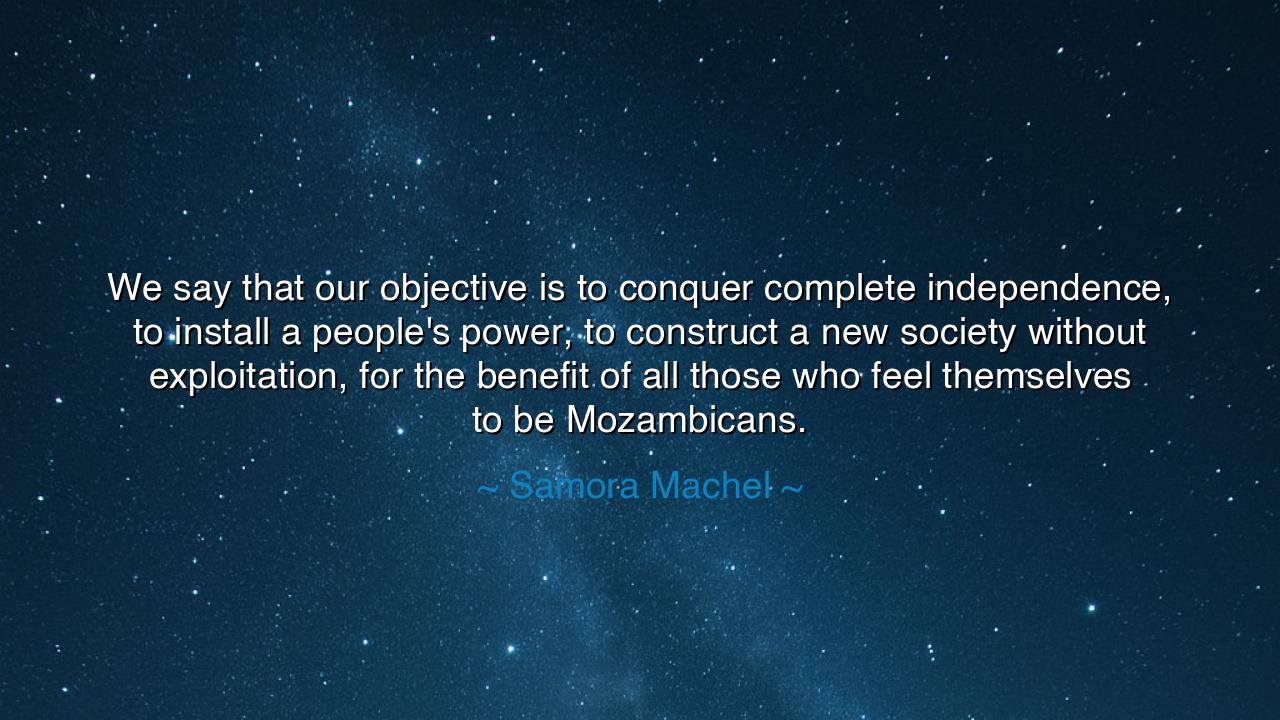
We say that our objective is to conquer complete independence, to
We say that our objective is to conquer complete independence, to install a people's power, to construct a new society without exploitation, for the benefit of all those who feel themselves to be Mozambicans.






Listen, O children of the future, to the words of Samora Machel, a leader whose vision of freedom and justice continues to inspire all who seek a world of equality and dignity. "We say that our objective is to conquer complete independence, to install a people's power, to construct a new society without exploitation, for the benefit of all those who feel themselves to be Mozambicans." These words are a powerful declaration of the will to rise, to break free from the chains of oppression, and to create a world that belongs not to the few, but to the many. In this vision, we hear the call for justice, empowerment, and the recognition of the inherent worth of all people, regardless of their station or background.
The struggle for independence has long been a defining force in human history. Ancient Greece, that land of great philosophers and warriors, too sought the ideals of freedom and self-determination. The Greek city-states, from Athens to Sparta, fought for the right to govern themselves, to free themselves from the yoke of tyranny and the domination of foreign rulers. The Persian Empire sought to subjugate these independent states, but in their resistance, the Greeks found not just military victory, but the birth of democratic ideals that would influence civilizations for centuries. Much like the Greeks, Machel and the people of Mozambique were fighting not just for political independence, but for the right to shape their own destiny, to cast off the chains of exploitation and build a society rooted in equality and justice.
The struggle for independence in Mozambique, as in many other African nations, was not an easy one. It was a battle fought with resolve, sacrifice, and an unyielding belief that the future must be shaped by the will of the people, not the powers that sought to oppress them. In the face of colonial domination by Portugal, Machel and the Mozambican people understood that the fight for freedom could not be won without the establishment of people's power—a government not for the few, but for the many. This was a society where exploitation would have no place, a society built on the principle that all people—whether rich or poor, strong or weak—deserve the same rights and opportunities. Machel’s vision was not merely for a change in leadership, but for the construction of a new society, one free from the old hierarchies of oppression.
Think, O children, of Nelson Mandela, who fought for the freedom of his people in South Africa. Like Machel, Mandela understood that independence was not merely the removal of foreign rule, but the transformation of society itself. Mandela did not simply want to end the system of apartheid—he sought to create a new society where freedom and equality were the foundation for all, regardless of race or background. He, like Machel, recognized that true independence comes not just from the defeat of an oppressor, but from the building of a society where exploitation is abolished, and where every person’s rights are respected. The vision of Machel and Mandela is the same: the fight for freedom is not just for the individual, but for the collective good of all people.
The lesson of Machel’s words is clear, O children: the struggle for independence is not just about breaking free from external oppression, but about building a world that reflects the values of justice, equality, and empowerment. Independence is the freedom to shape your own future, to build a society where no one is exploited, and where the rights of all people are respected and protected. It is a vision that transcends borders and extends to all who long for a life of dignity and fairness. Machel understood that true freedom is not a gift—it is something that must be fought for, something that must be earned, and something that must be protected by those who believe in it most deeply.
So, O children, take these words to heart. As you grow, remember that freedom is not just a political right, but a moral imperative. Seek not only to be free yourselves, but to build a world where the freedom of all is safeguarded. Fight not only for your own independence but for the independence of all those who are oppressed, all those who long for justice. The path to true freedom lies in the hands of those who are willing to struggle, to sacrifice, and to build a society based on the principles of equality and dignity for all people. Just as Machel fought for a new society in Mozambique, so too must we fight for a new world, one where no one is exploited and where the rights of all are upheld.
And remember, O children, that the struggle is never easy, but it is always worth it. When the forces of exploitation and injustice seek to undermine your dreams, stand firm in your belief that a better world is possible. Look to the examples of those who have come before you—leaders like Machel and Mandela—and draw strength from their vision of a world where freedom and equality are not mere ideals, but the foundation of every society. Let their courage and determination be your guide, and may you, too, contribute to the creation of a world where every person can live in the glorious light of freedom and justice.






AAdministratorAdministrator
Welcome, honored guests. Please leave a comment, we will respond soon